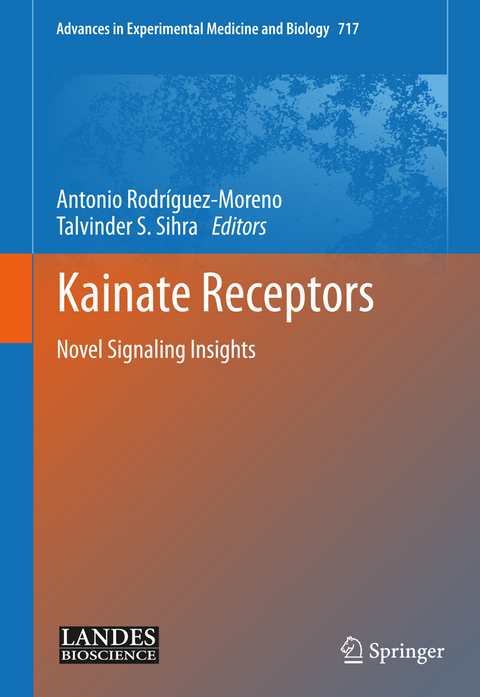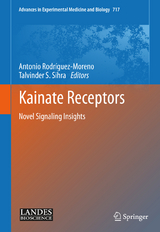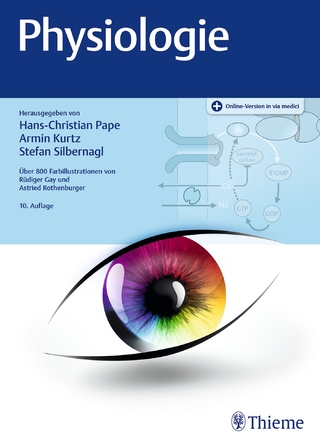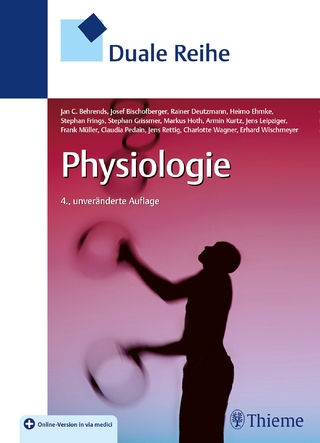Kainate Receptors
Springer-Verlag New York Inc.
978-1-4419-9556-8 (ISBN)
ANTO NIO RODRIGUEZ‑MORENO is Associate Professor and Head of the Cellular Neuroscience and Plasticity Laboratory at the University Pablo de Olavide, in Seville, Spain. His main research interests include the study of the mechanisms of synaptic plasticity in cortex and hippocampus and the physiology of glutamate receptors of the NMDA and kainate type. He is a member of the Federation of European Neuroscience Societies (FENS) and the Society for Neuroscience (SFN). Following a degree in Biological Sciences at the University of Seville, Dr. Rodriguez‑Moreno received his PhD degree in Neurobiology and Molecular Biology from Cajal Institute and the University Automous of Madrid in Madrid, Spain. During a first postdoc at the University Pablo de Olavide, in Seville (Spain) he studied the mechanisms of learning and memory in awake animals. This was followed by a postdoctoral stay at University College London (UK) where he investigated the actions of kainate receptors using synaptosomes and brain slices. During a third postdoc at University of Oxford, he started to study the mechanisms of brain plasticity processes. TAL VINDER S. SIHRA is a Reader in Cellular and Molecular Neuroscience, and Teaching Lead in the Department of Neuroscience, Physiology and Pharmacology at University College London (UCL) UK. His main research interests are in the elucidation and characterisation of presynaptic receptors and downstream signaling pathways involved in the modulation of neurotransmitter release. Pursuant to an undergraduate degree in Biochemistry and Physiology from the University of Sheffield, UK, he completed his PhD (Biochemistry) in 1985 at the University of Dundee, Scotland, where he initiated his studies looking at the mechanisms underlying amino acid neurotransmitter release. He extended these studies at the Rockefeller University,New York, USA, in the laboratory of Professor Paul Greengard, Nobel Laureate in Medicine (2000), looking at the role of protein phosphorylation in presynaptic function and plasticity. In 1993, he obtained a faculty position at the University of London (Royal Free Hospital School of Medicine), and continued thereafter at UCL. Dr. Sihra is a member of the Biochemical Society (UK) and currently on the Signalling theme panel for the Society. He is a member of the Society of Neuroscience and former editor of the British Journal of Pharmacology. TAL VINDER S. SIHRA is a Reader in Cellular and Molecular Neuroscience, and Teaching Lead in the Department of Neuroscience, Physiology and Pharmacology at University College London (UCL) UK. His main research interests are in the elucidation and characterisation of presynaptic receptors and downstream signaling pathways involved in the modulation of neurotransmitter release. Pursuant to an undergraduate degree in Biochemistry and Physiology from the University of Sheffield, UK, he completed his PhD (Biochemistry) in 1985 at the University of Dundee, Scotland, where he initiated his studies looking at the mechanisms underlying amino acid neurotransmitter release. He extended these studies at the Rockefeller University, New York, USA, in the laboratory of Professor Paul Greengard, Nobel Laureate in Medicine (2000), looking at the role of protein phosphorylation in presynaptic function and plasticity. In 1993, he obtained a faculty position at the University of London (Royal Free Hospital School of Medicine), and continued thereafter at UCL. Dr. Sihra is a member of the Biochemical Society (UK) and currently on the Signalling theme panel for the Society. He is a member of the Society of Neuroscience and former editor of the British Journal of Pharmacology. TAL VINDER S. SIHRA is a Reader in Cellular and Molecular Neuroscience, and Teaching Lead in the Department ofNeuroscience, Physiology and Pharmacology at University College London (UCL) UK. His main research interests are in the elucidation and characterisation of presynaptic receptors and downstream signaling pathways involved in the modulation of neurotransmitter release. Pursuant to an undergraduate degree in Biochemistry and Physiology from the University of Sheffield, UK, he completed his PhD (Biochemistry) in 1985 at the University of Dundee, Scotland, where he initiated his studies looking at the mechanisms underlying amino acid neurotransmitter release. He extended these studies at the Rockefeller University, New York, USA, in the laboratory of Professor Paul Greengard, Nobel Laureate in Medicine (2000), looking at the role of protein phosphorylation in presynaptic function and plasticity. In 1993, he obtained a faculty position at the University of London (Royal Free Hospital School of Medicine), and continued thereafter at UCL. Dr. Sihra is a member of the Biochemical Society (UK) and currently on the Signalling theme panel for the Society. He is a member of the Society of Neuroscience and former editor of the British Journal of Pharmacology.
Metabotropic Actions of Kainate Receptors in the Control of GABA Release.- In the Developing Hippocampus Kainate Receptors Control the Release of GABA from Mossy Fiber Terminals via a Metabotropic Type of Action.- Localization and Functions of Kainate Receptors in the Basal Ganglia.- Metabotropic Actions of Kainate Receptors in the Control of Glutamate Release in the Hippocampus.- Metabotropic Actions of Kainate Receptors in the Regulation of IsAHP and Excitability in CA1 Pyramidal Cells.- Kainate Receptors with a Metabotropic Signature Enhance Hippocampal Excitability by Regulating the Slow After‑Hyperpolarization in CA3 Pyramidal Neurons.- Metabotropic Actions of Kainate Receptors in Dorsal Root Ganglion Cells.- Role of Kainate Receptors in Network Activity during Development.- Kainate Receptor Modulation by Sodium and Chloride.- BTB‑Kelch Proteins and Ubiquitination of Kainate Receptors
| Reihe/Serie | Advances in Experimental Medicine and Biology ; 717 |
|---|---|
| Zusatzinfo | XX, 131 p. |
| Verlagsort | New York, NY |
| Sprache | englisch |
| Maße | 178 x 254 mm |
| Themenwelt | Studium ► 1. Studienabschnitt (Vorklinik) ► Physiologie |
| Naturwissenschaften ► Biologie ► Genetik / Molekularbiologie | |
| ISBN-10 | 1-4419-9556-0 / 1441995560 |
| ISBN-13 | 978-1-4419-9556-8 / 9781441995568 |
| Zustand | Neuware |
| Haben Sie eine Frage zum Produkt? |
aus dem Bereich




